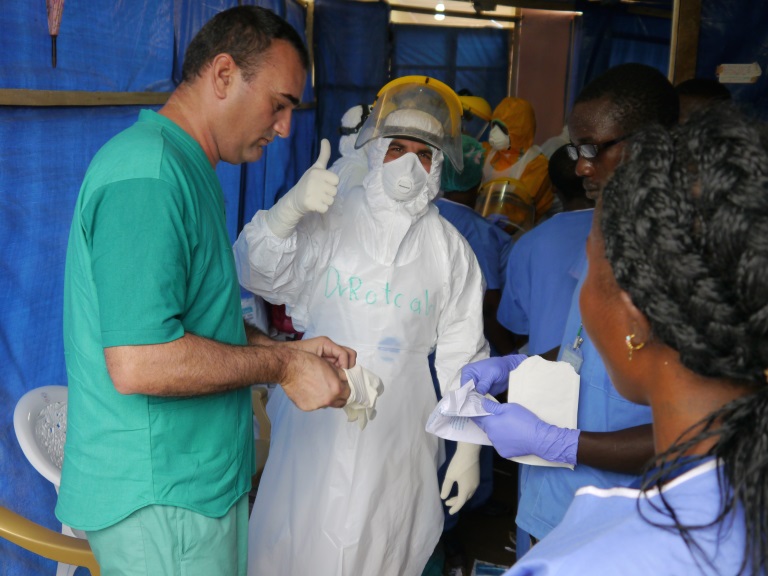 Researchers who work on infectious disease often need to be agile in their ability to shift their focus – and their skills – to disease epidemics, which can be unpredictable in their burden. Many low- and middle-income countries are used to dealing with endemic diseases such as cholera and malaria. However, when such diseases become outbreaks, countries are often unable to undertake health research. This underscores the importance of putting effort and investment prior to outbreaks to build health system resilience and outbreak preparedness.
Researchers who work on infectious disease often need to be agile in their ability to shift their focus – and their skills – to disease epidemics, which can be unpredictable in their burden. Many low- and middle-income countries are used to dealing with endemic diseases such as cholera and malaria. However, when such diseases become outbreaks, countries are often unable to undertake health research. This underscores the importance of putting effort and investment prior to outbreaks to build health system resilience and outbreak preparedness.
The COVID-19 pandemic is testing the health research capacity of every country in an unprecedented way. TDR has been supporting training programmes to strengthen capacity for research on infectious diseases of poverty for many years – and a recent TDR survey has shown that substantial numbers who have been trained were able to pivot their skills to respond effectively to COVID-19.
In total, around 60% (411 of 699) of respondents from the three training programmes surveyed have been involved in research on COVID-19. Almost 80% (315/411) of those involved were directly applying skills learned during TDR training to fight the pandemic.
TDR’s programmes to boost research capacity
TDR supports several programmes to increase research capacity, including three in particular which were surveyed. In the Postgraduate Training Scheme, TDR strengthens individual and institutional capacity for implementation research by supporting a network of seven universities in the disease-endemic regions to train Master’s students on courses relevant to implementation research.
For the Clinical Research and Development Fellowship (CRDF) scheme, TDR supports placements of researchers with partners including pharmaceutical companies, product development partnerships, and public research institutions involved in clinical research to strengthen their skills in clinical trials.
The Structured Operational Research and Training IniTiative (SORT IT) is a global partnership-based initiative coordinated by TDR and implemented by various partners including Ministries of Health, non-governmental organizations and academic institutions. “SORT IT helps generate high quality, timely and disaggregated data which is essential for ensuring that countries tackling COVID-19 become “data rich, information rich and action rich,” says Dr Rony Zachariah, TDR's SORT IT coordinator.
Supporting low- and middle-income countries in strengthening research capacity is very much aligned with WHO’s R&D blueprint for research and development that is intended to drive the development of tests, vaccines and medicines so that the response to an outbreak has the right tools at its disposal. “The focus on R&D needs to be complemented by efforts to promote implementation research, which helps to make sure that as new diagnostics, drugs and vaccines emerge from R&D pipelines, evaluated in clinical trials and approved, they are made available to all who could benefit from them,” says Dr Dermot Maher, Coordinator, Research Capacity Strengthening Unit, TDR.
TDR training has led to transferable skills
The survey shows that the skills that people gained through these three research training programmes have allowed them to support both the research response to COVID-19 and the broader health system response. This ability to transfer the skills learnt in the training programme is critical to sustaining resilient health research systems, says Dr John Reeder, Director, TDR. “Long-term investment in health research capacity, before a major epidemic or pandemic, can make all the difference in responding effectively to the challenge when it comes.”
Among the 58 people who reported using skills gained from postgraduate master’s training, 26 (45%) were involved in implementation, operational research or clinical research. Among the 219 people who reported using skills gained from the SORT-IT programme, 56 (26%) were involved in implementation and/or clinical research. Of the 38 people who reported using skills gained during their CRDF training (often provided by pharmaceutical companies), 28 (74%) were involved in clinical research through a variety of roles, most commonly as clinical trial manager.
Oluwagbenga Ogunfowokasn from Nigeria has submitted a technical proposal to Smart Africa Secretariat in Rwanda in response to an emergency call for a proposal to provide support to African Union countries. “We have formed a consortium to respond to the COVID-19 crisis in Africa using my team management, protocol writing and data management skill,” says Ogunfowokasn. “The purpose of the proposal is to assist the African Union in flattening the curve of COVID-19 transmission.”
Another researcher from Colombia, Maria Castro del Mar, says “The skills in clinical research and grant writing helped me to contribute as a co-investigator in the design of a seroprevalence study, which was submitted and approved for funding. This study involved multiple partners from Colombian and international institutions.” Castro del Mar adds that she has used her “skills in project management for contingency planning and response for other research projects. These skills will be also applied for supporting the coordination of the COVID-19 study that was recently approved.”
Many people who trained on programmes to strengthen capacity for research before the COVID-19 pandemic are currently involved in a range of health system areas, including critical preparedness and response, situation analysis/surveillance, infection control and clinical management, data generation, analysis and reporting, and mitigating the effect of COVID-19 on other diseases. This indicates that boosting research capacity has collateral benefits that go beyond research to strengthen the pandemic response.

